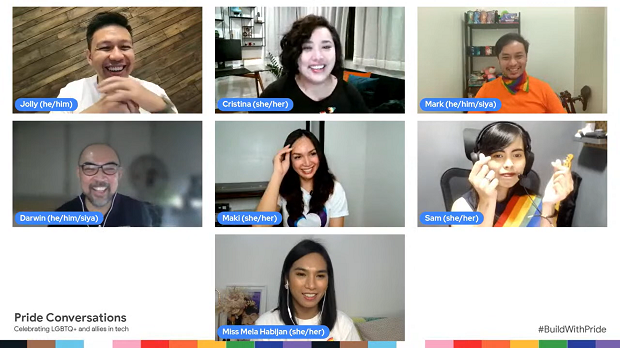Google Philippines held on Tuesday, June 21, its third annual Pride Conversations where a panel of LGBTQ+ representatives discussed how technology empowered them to build safe spaces for their community. In these online spaces, the community could express themselves selves, forge connections, and tell their stories.

While usually seen as colorful celebrations, the panelists agreed that Pride Month events like Google’s are more than happy gatherings. They rally the LGBTQ+ community and their allies to the fight for the recognition the community lacks until today.
Mark Lacsamana, UI design dead at PageUp, captured this sentiment: “We still have to remember that there are still people that are left behind and we have to use whatever we have, whatever privilege we have, to make sure that everyone enjoys those privileges.”
“Because nobody is free until everybody is free,” he asserted.
In this ongoing fight, technology is a game-changer, they said. Mela Habijan, the first ever Miss Trans Global 2020, described how technology opened doors for her to be herself after dreams and career paths were closed by traditional expectations of masculinity and femininity.
“Ninang tech became my space of freedom and empowerment, while Ninang digital world was an open-minded platform which did not judge me as different. Instead, Ninang digital world saw my being trans and my being LGBTQIA+ as a leverage of potential. And finally, Ninang social media — she is a democratic arena that allowed me to seize opportunities for me to believe in myself: that I can be my best, that I can be talented,” Habijan explained.
By creating these safe spaces, technology enabled the LGBTQ+ community to connect authentically with other members and people outside of it.
Samantha Rose Cruz, product designer for live-streaming platform XSplit and cofounder of Tambayan 404, touched on technology’s instrumental role to connect the LGBTQ+ community during the pandemic’s lockdowns.
“Many of us felt isolated, but our community has always been about showing up for people,” she said. “Thanks to technology, it gave rise internet communities…it has allowed people to find support groups and communities online where we feel safe and connected again.”
Maki Gingoyon, co-founder of MyTransgenderDate.com, an international dating site for transgender women, chimed in with her own experience of connection. She recalled that before MyTransgenderDate’s launch in 2013, dating sites catered to sexually-fetishized views of transgender women.
“We created my transgender date because obviously there is a need for a safe space and a dating site for my transisters… and I’m so proud that we are serving 1.5 million transisters worldwide in connecting with their other half in a safe digital space,” she declared.
On the other hand, in her line of work as fintech company First Circle’s head of design, Cristina del Rosario shared how being part of the LGBTQ+ community helps her connect with the needs of other marginalized groups. It drives her to ask questions and learn about other’s experience.
“How can I design a product that works wonderfully? For everybody, including people who might be colorblind or people with low literacy or people who have never used a smartphone before? And so being part of the LGBTQ+ community, helps me understand other communities and pushes me to design better products,” she explained.
Lastly, the panelists emphasized the role of technology as a leveler. Darwin Mariano, producer and founder of Ticket2Me and one of the cofounders of the popular video series Boys Lockdown (2020), pointed out technology’s ability to revolutionize content production.
“Platforms like YouTube have been really, really groundbreaking for us because we can bypass the traditional gatekeepers of content, many of whom would usually not allow these kinds of stories to make it to mainstream. But if we can demonstrate kasi success online, then it becomes easier for us to open doors through the traditional channels,” he revealed.
Yet, even Google itself admits that technology is not enough. More needs to be done to support the LGBTQ+ community’s fight for equality.
“Platforms like this that tell inspiring stories about the community are crucial, but there’s still so much more to be done for LGBTQ+. Only if we work together towards cultural and policy change can we be in a world that is equal and without prejudice,” Bernadette Nacario, country director of Google Philippines, stated.




